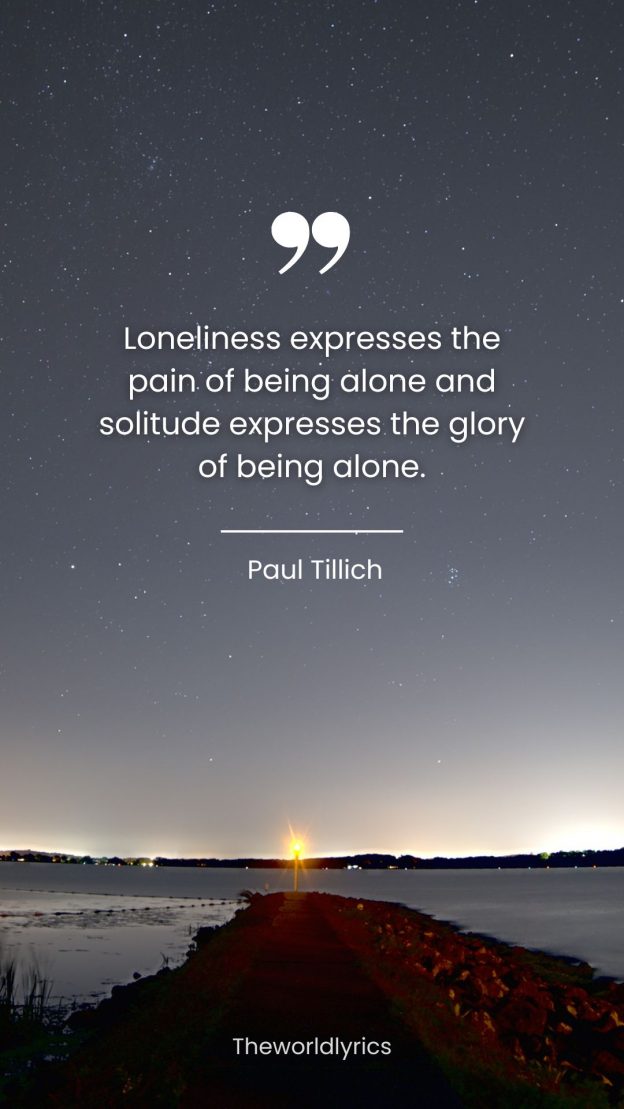Loneliness is often viewed as a negative emotion, evoking the sense of despair and loss that comes with separation from others. The feeling of loneliness is essentially the pain of being alone. However, it’s crucial to remember that there’s a profound difference between loneliness and solitude. Solitude is a self-chosen state of being alone, which is viewed as an opportunity for self-reflection, self-improvement, and inner growth. In this article, we will explore the differences between loneliness and solitude while shedding light on the glory of being alone and the benefits it can offer.
What is Loneliness?
Loneliness is a universal human emotion that is complex and unique to each individual. It’s an overwhelming emotional response to perceived isolation or lack of connection with others.
> “The eternal quest of the individual human being is to shatter his loneliness.” -Norman Cousins
The problem with loneliness stems from its negative connotations. The pain associated with loneliness can lead to depression, anxiety, and other mental health issues. When we’re lonely, we feel inadequate, unworthy, and rejected by society. It is essential to remember that loneliness can be experienced even when surrounded by friends and loved ones – it is the quality, not quantity, of relationships that determine whether one feels lonely.
What is Solitude?
On the other hand, solitude is the state of being alone without feeling lonely. It is a self-imposed isolation that can foster self-discovery, reflection, and inner growth.
> “In solitude, the mind gains strength and learns to lean upon itself.” – Laurence Sterne
Solitude is not running away from the world but rather immersing oneself in it fully. It provides a liberating space, free from the judgments and expectations of others, allowing for the opportunity to explore one’s interests, passions, and quirks without hindrance.
The Importance of Solitude
The glory of solitude is found in its ability to provide a sense of empowerment, enhanced creativity, and heightened self-awareness. Here are some powerful aspects of solitude:
Self-Discovery
> “The greatest thing in the world is to know how to belong to oneself.” – Michel de Montaigne
Solitude enables an individual to gain a deeper understanding of themselves by providing the perfect environment for self-reflection. When we escape external distractions, our thoughts and feelings become clearer, making it easier to discover our passions, beliefs, values, and desires.
Enhanced Creativity
> “Without great solitude, no serious work is possible.” – Pablo Picasso
Solitude can meet the fertile ground for creativity. Being alone allows the mind to wander freely, making connections that might not be possible in a noisy or crowded environment. In this free space, we can generate new ideas, put them to the test, and allow our creativity to flourish.
Emotional Resilience
> “What a lovely surprise to finally discover how unlonely being alone can be.” – Ellen Burstyn
Spending time alone teaches us to become more emotionally resilient. We learn to rely on ourselves for support and validation, rather than seeking it from others. This self-reliance allows us to approach life’s challenges with courage and confidence.
Mental Health Benefits
> “Solitude is creativity’s best friend and solitude is refreshment for our souls.” – Naomi Judd
Taking periodic breaks from social engagements and reaping the benefits of solitude can improve overall mental health. Research suggests that spending time alone can reduce stress, increase a sense of well-being, and improve concentration.
Transforming Loneliness Into Solitude
While loneliness expresses the pain of being alone, solitude expresses the glory of being in one’s company. If you find yourself feeling lonely, it is possible to transform loneliness into solitude by embracing the following practices:
Adjust Your Mindset
> “Loneliness and the feeling of being unwanted is the most terrible poverty.” – Mother Teresa
We have the power to shift our mental state from loneliness to solitude by changing our perspective on being alone. Instead of viewing it as a negative experience, try to see it as an opportunity for growth and self-improvement. Embrace the alone time, and remember that it is temporary.
Practice Mindfulness
> “Realize deeply that the present moment is all you will ever have.” – Eckhart Tolle
Mindfulness is a powerful tool for transforming loneliness into solitude. It involves being fully present in the moment, without judgment or distraction. By practicing mindfulness, you can cultivate a sense of inner peace that transcends loneliness and cultivates an appreciation for solitude.
Cultivate Connections
> “The friend who can be silent with us in a moment of despair or confusion, who can stay with us in an hour of grief and bereavement, who can tolerate not knowing… not healing, not curing… that is a friend indeed.” – Henri Nouwen
While solitude is valuable, it’s also essential to maintain connections with others. Reach out to friends and family members, make an effort in nurturing relationships, and don’t be afraid to seek help if you’re struggling. Remember, it is not solitude if it’s involuntary – that’s loneliness.
Invest in Personal Growth
> “The only way to be truly happy is to get your mind completely off yourself, and this can only be accomplished by becoming genuinely interested in other people.” – Dale Carnegie
Take advantage of your alone time to work on personal growth. Develop new hobbies, learn new skills, and educate yourself on subjects that interest you. As you grow, you’ll find that the pain of loneliness transforms into the empowering glory of solitude.
In Conclusion
Loneliness expresses the pain of being alone, while solitude expresses the glory of being alone. By understanding the differences between loneliness and solitude, we can not only reshape our mindset but also learn to embrace being alone as an opportunity for growth and self-discovery. The next time you find yourself feeling lonely, remember that solitude can transform your life, offering creative potential, emotional resilience, and a newfound appreciation for your unique qualities.
